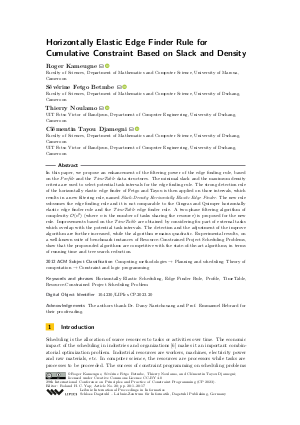LIPIcs.CP.2023.20.pdf
- Filesize: 1.27 MB
- 17 pages

 Creative Commons Attribution 4.0 International license
Creative Commons Attribution 4.0 International license

In this paper, we propose an enhancement of the filtering power of the edge finding rule, based on the Profile and the TimeTable data structures. The minimal slack and the maximum density criteria are used to select potential task intervals for the edge finding rule. The strong detection rule of the horizontally elastic edge finder of Fetgo and Tayou is then applied on those intervals, which results in a new filtering rule, named Slack-Density Horizontally Elastic Edge Finder. The new rule subsumes the edge finding rule and it is not comparable to the Gingras and Quimper horizontally elastic edge finder rule and the TimeTable edge finder rule. A two-phase filtering algorithm of complexity 𝒪(n²) (where n is the number of tasks sharing the resource) is proposed for the new rule. Improvements based on the TimeTable are obtained by considering fix part of external tasks which overlap with the potential task intervals. The detection and the adjustment of the improve algorithm are further increased, while the algorithm remains quadratic. Experimental results, on a well-known suite of benchmark instances of Resource-Constrained Project Scheduling Problems, show that the propounded algorithms are competitive with the state-of-the-art algorithms, in terms of running time and tree search reduction.























Feedback for Dagstuhl Publishing